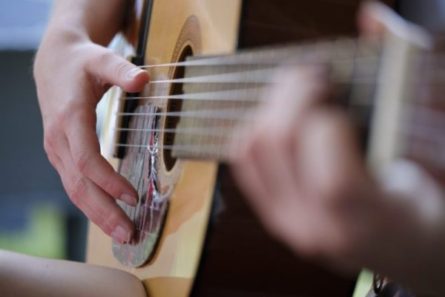3 Tips To Love Playing
Scales

Playing scales is widely considered to be a great way to practice guitar, yet many of us avoid it like the plague. Unless you’re the kind of guitarist who does a lot of improvisation or composing, you probably think of scales as a dry and technical approach to practice. These tips might just help you rethink that!
2) Use Them To Meditate

I’ve noticed that when I sit down to practice something I don’t really want to play, I have trouble concentrating during the session. My mind is likely to drift away from the material at hand, with me wondering what’s happening for dinner, or worrying that my friend did take offense when I told him I was moving (and taking a lower-paying job) just to get away from him.
These kinds of non-guitar thoughts can ruin an otherwise promising session. In order to avoid this pitfall, I suggest you adopt an Eastern approach of trying to maintain presence in the moment. And believe it or not, scales can help facilitate this.
The reason most of us love (and want to spend all our time practicing) normal music is party because it’s infused with emotion. “You Belong With Me” by Taylor Swift can bring back memories of our middle-school crush. Beethoven’s Moonlight Sonata fills us with a deep longing and sense of profound sadness; “Let it Go” from Disney’s Frozen makes us feel empowered and free; “Killing in the Name” by Rage Against the Machine arouses our rebellious spirit, awakening our anger with a broken system.
The worst thing about scales becomes the best thing in a different sense: the boring, emotionless quality of scales is exactly what makes them relaxing and peaceful. I’ve had many an enjoyable scale-session by framing them as a kind of
meditation. I sit down, clear my mind, and focus on the perfect ascending and descending slopes of a scale.
Needless to say, this mentality also lends itself to slow playing. You may be surprised and encouraged by how quickly you’ll improve if you just play scales slowly on a daily basis.

Stay tuned for more posts, and thanks for reading!
1) Play Them Slowly

Anyone remotely familiar with this site should recognize that advice. However, knowing that you ought to play slowly is very different from being able to do it. Good old Socrates once drew a distinction between knowing something in a
superficial way, such as having “heard of it,” and knowing something in a deep and profound way. This second, profound type of knowledge leads to action, whereas the former leads nowhere.
So, in order to be able to achieve slow playing, you’re going to have to hear it recommended many times. Which means I’m going to repeat it many times! Sorry, folks.
Seriously, though, you should know that scales in particular benefit from slow playing. They’re some of the most challenging exercises on the guitar, so assimilating them is best done at leisurely tempos. Don’t think you’ll be going that speed forever, but you’ll need to at first in order to gain a certain fluency.
How to Start Playing Slowly
I start practicing every new scale at 60 bpm on the metronome, with one note for each click. Often, I even go that pace for scales I know well, just to further solidify them. That’s going to feel super slow for you, I’m sure, but you’ll find your patience rewarded when the scale feels that much more secure under your fingers.
Playing slowly also enables you to “zoom in” on your sound. Fast playing has a way of concealing certain nuances in tones and phrases. Short riffs played too quickly are often hard to discern. If you manage to slow things down, you might notice all kinds of small mistakes you didn’t know you were making. You might notice that your transitions between notes aren’t as clean as you’d thought, or that your second-fret barre always buzzes on the “A.” Nothing helps polish a song you’re working on like that sort of attention to detail!
3) Treat Them as a Safe Haven

Almost one year ago today, I had an important medical appointment in Boston that I was stressed about. Never at ease driving into the big city, I decided to head out a few hours early and bring my guitar with me, thinking I’d play somewhere quiet in order to relax before meeting my doctor. I found a small park near the hospital, pulled out my steel string acoustic, and began to play in public for the first time.
The experience was mixed at first. I felt excited to be playing while strangers walked by and listened on, but my finger-movements were nervous and uncoordinated, so I found myself slipping on formerly secure passages. I decided to slow things down and try to regain confidence in my playing by falling back on scales, the pieces I knew best of all.
Playing those scales did wonders for me. They brought in a rock-solid foundation and demonstrated how well I could play, which shored up my fingers for my true repertoire. Scales may not be the most interesting repertoire in the world, but they’re satisfying and harmonious, especially if you play them somewhat musically, hence their being the basis for much improvisation.
If you’re just starting out on the guitar, or even if you’re a somewhat experienced player who’s looking to branch out from strumming chords into the rest of the guitar universe, I think scales can be an excellent anchor for you. They firmly tie you into a key and a set of notes that work together.
Establishing scales by slow playing creates a high standard for the rest of your playing. Once you’re familiar with a few scales, virtually all scale-type passages become a lot less daunting.
If you’re a total beginner, I would just focus on learning one scale at a time. Don’t worry too much about which ones to start with! If you’re an electric guitarist, you might favor E minor pentatonic, whereas a classical guitarist might focus on two- octave major and minor scales. Just get one of them under your fingers at a time, collecting them gradually as you might collect recipes for home cooking.
But enough discussion—get out there and play some scales! You won’t regret the time spent, and if you follow the tips above, you might just have yourself a good time.



